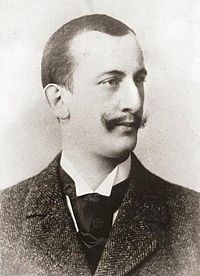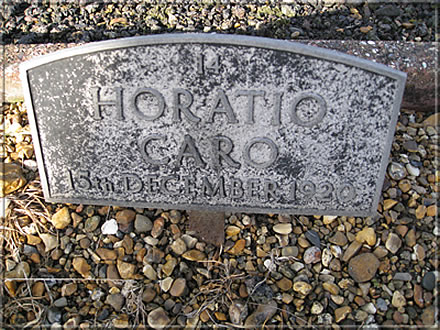
We remember Horatio Caro who passed away on Wednesday, December 15th, 1920.
Horatio Caro was born on Saturday, July 5th 1862. On the same day Heinrich Georg Bronn, German geologist and paleontologist passed away.
His parents were (in the 1861 census) Jacob and Mathilda Caro (née Lüpschütz, possibly Lipschütz) living at 4, Warwick Place, Jesmond, Newcastle upon Tyne.
Horatio’s birth was recorded at Lombard Street, Newcastle upon Tyne.
Jacob and Horatio moved to Berlin to live at 2, Winterfeld Strasse. They both had joint German/British citizenship.
In 1896 Jacob passed away and his affairs were handled by family solicitors, Daggett and Grey of 3 Dean Street, Newcastle-upon-Tyne:

On December 15th 1920 JHD Reid, Master of the Institution of South Grove (a workhouse) recorded the discharge of Horatio. The reason stated was “dead”.
His death was registered in Mile End Old Town and he is buried in the East Ham Jewish cemetery, London Borough of Newham, Greater London located at Section E Row 18 Plot 14.

According to Wolfgang Heidenfeld in The Encyclopedia of Chess (Batsford, 1977), Harry Golombek OBE :
“A minor English master who spent most of his chess life in Berlin. Though he had indifferent tournament not much better match results (he lost to Mieses, and Winawer, drew twice with Von Bardeleben and beat Lewitt), his name has become immortal through the Caro-Kann Defence, which he expounded in his own journal, Brüderschaft, in 1886.”
The Caro-Kann Defence is characterised by
(as an alternative to the French Defence) in which the c8 bishop may be active from an early stage.
Caro famously was able to overcome Emanuel Lasker in just 14 moves in 1890 :
There is also the Caro Variation of the Ponziani Defence which was known since the 1850s and recommended by Caro in Deutsches Wochenschach, 1893:
From Chess, Facts and Fables (McFarland and Company, Inc., 2006), page 12, Chess Note 3096, Edward Winter :
“We can now add a tenth specimen to the collection (of ‘Rare queen sacrifices’), having noted the following position on page 81 of Brüderschaft, 10 March 1888 :
The magazine (see also page 155 of the 12 May 1888 issue) stated that in this game, played in February 1888 (in Berlin?), Horatio Caro mated his unidentified opponent in five moves as above.”
In another place we are grateful to Brian Denman who mentioned that Caro made an appearance for the Great Britain team in the 1898 cable match against America. He lost on board 3 against John Barry.
Richard James replied : “He also represented Berlin in a cable match against New York in 1905. EdoChess has his highest rating as 2545 (11th in the world) in 1892.”
In a Comment to this post Tim Harding asks : “Caro was one of the British invitees to the London 1899 international but he withdrew before the start because of illness. Does anyone know what was wrong with him?”
Also, according to Richard James :
“He spent most of his life in Germany. Page 353 of the Jubiläums-Ausgabe (1926) of Kagans Neueste Schachnachrichten (yes, I also read Edward Winter’s Chess Notes) claims that he lived in Frankfurt up to his 22nd year and in Berlin from 1882 onwards (arithmetic fail). Some sources claim, incorrectly, that he died in Berlin.
His death was registered in Mile End Old Town. In the 1911 census there are a lot of Caros in St George in the East, just the other side of the Commercial Road from Mile End Old Town, from their first names clearly Jewish. There’s also Blanche Caro, a 65-year-old Polish born widow, described as a furrier, in hospital in Mile End Old Town.”
There is extensive discussion from the same above source.
From Wikipedia :
“Horatio Caro (5 July 1862 – 15 December 1920) was an English chess master.
Caro was born in Newcastle upon Tyne, England,[1] but spent most of his chess career in Berlin, Germany. He played several matches. In 1892, he drew with Curt von Bardeleben (+2 –2 =2), lost to Szymon Winawer (+2 –3 =1). In 1897, he lost to Jacques Mieses (+3 –4 =3). In 1903, he drew with Bardeleben (+4 –4 =0). In 1905, he won against Moritz Lewitt (+4 –3 =5).
In tournaments, he won in Berlin (1888, 1891, 1894, 1898 (jointly), and 1903). He also took 10th at Berlin 1883, took 4th at Berlin 1887, tied for 2nd-3rd at Nuremberg 1888, took 3rd at Berlin 1889, took 2nd at Berlin 1890.
He took 3rd at Berlin 1894, took 9th at Berlin 1897, took 17th at Vienna 1898, took 4th at Berlin 1899, tied for 6-7th at Berlin 1902, tied for 11-12th at Coburg 1904, tied for 7-8th at Barmen 1905, took 9th at Berlin 1907, tied for 3-5th at Berlin 1908, and took 4th at Berlin 1911.
Caro died in London at age 58.
His claim to fame is linked to the opening Caro-Kann Defence (B12), which he analysed along with Marcus Kann and jointly published about on the German journal Bruederschaft in 1886.”

Caro was one of the British invitees to the London 1899 international but he withdrew before the start because of illness. Does anyone know what was wrong with him?